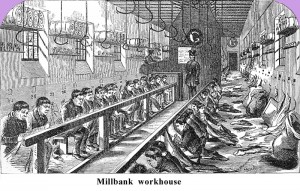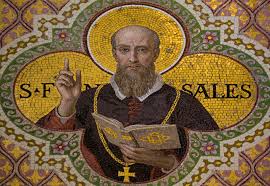Last Thursday I posted some reflections on Pope Francis’s recent Apostolic Exhortation Evangelii Gaudium, in particular focusing on its statements on the global economy. I examined these statements in the light of what the social teaching of Popes John Paul II and Benedict XVI had to say about the relationship between the economy and culture, noting that Francis’s comments are quite consistent with the teaching of his two predecessors.
In this post I want to further explore the relationship between the economy and the state in Catholic social teaching and to examine Evangelii Gaudium in light of that relationship. As I noted in my previous post, and as anyone who has kept up with the commentary on the document knows, it is disagreement over this relationship that has generated much of the controversy over Francis’s comments.
Perhaps the best place to start is to point out that criticism of capitalism, or for that matter advocacy for state intervention in the economy, does not necessarily imply “socialism” or even “Marxism,” as some critics of Pope Francis have claimed. Our political discourse demonstrates a real poverty of language in that some advocate more market, some advocate more state, but we rarely articulate what purpose either is meant to serve. Both Popes John Paul II and Benedict XVI have noted this problem. For example, in Centesimus Annus, John Paul writes:
The individual today is often suffocated between two poles represented by the State and the marketplace. At times it seems as though he exists only as a producer and consumer of goods, or as an object of State administration. People lose sight of the fact that life in society has neither the market nor the State as its final purpose, since life itself has a unique value which the State and the market must serve” (#49).
Benedict is just as clear in Caritas in Veritate: “The continuing hegemony of the binary model of market-plus-State has accustomed us to think only in terms of the private business leader of a capitalistic bent on the one hand, and the State director on the other” (#41). The problem with being accustomed to think in this way is that “The exclusively binary model of market-plus-State is corrosive of society” (#39). Clearly both popes are suggesting that we cannot approach social problems in the simplistic terms of more market or more state, but rather must consider the “final purpose” which both should serve.

The United Kingdom’s New Poor Law of 1834 denied poor relief to anyone who did not work in a workhouse.
To help wrap our minds around what this might mean, it is useful to look at some work in the field of political science. After studying the welfare states of the developed world, Gøsta Esping-Andersen and Kees van Kersbergen have noted that government-market interactions have taken at least three distinct forms: liberal, socialist/social democratic, and conservative/Christian democratic (Here the terms “liberal” and “conservative” are being used in their European senses; practically all mainstream American liberals and conservatives are “liberals” in this sense). These three forms represent different ways of understanding the purpose of government intervention in the economy. Liberal states most highly value the market, and therefore their primary purpose is to encourage people to participate in the labor market either through state discipline or welfare. Socialism, on the other hand, has the most negative view of the market, seeing the commodification of labor as inherently dehumanizing. Whereas radical socialisms such as Marxism attempt to completely replace the market economy, more moderate social democratic states instead see the purpose of government as providing generous welfare services so that a decent standard of living is available outside the labor market. Finally, the conservative or Christian democratic state, unlike the social democratic state, does not see the exchange of labor in the market as inherently dehumanizing; rather, the market is dehumanized when it is alienated from the wider social networks and communities of which people are a part. Therefore the purpose of the state, in this view, is to embed the market in this broader network of communities, which not only are good in themselves, but also provide important welfare functions.
Interestingly, according to both Esping-Andersen and van Kersbergen, it is this third model that has been least recognized in the scholarly literature. For example, one of the spurs for their own research was the finding that increasing levels of welfare spending in European nations, which most assumed necessarily signaled a move toward social democracy, has not led to similar outcomes across nations; what they found is that while spending increased, it was devoted to programs structured in different ways to serve different purposes. In other words, their research has challenged the same market-state binary identified by the popes.
We can also see that what Popes John Paul II and Benedict XVI have advocated fits within the third tradition identified by Esping-Andersen and van Kersbergen. Similarly, one of the most insightful commentaries on Evangelii Gaudium, by Heather Horn, argues that Pope Francis’s thought reflects neither capitalism nor Marxism, but rather the thinking of the sociologist Karl Polanyi, who argued that under capitalism, “instead of the market existing to help humans live better lives, humans were ordering their lives to fit into the economy.” Horn is right to see Francis’s as an alternative voice to both the Left and the Right, although she has her history backward; social Catholicism provided this alternative voice long before Polanyi.
Regardless, as an alternative to the market-state binary, Pope Benedict proposes “economic forms based on solidarity, which find their natural home in civil society without being restricted to it” (#39). Recognizing that solidarity, fraternity, and reciprocity arise most naturally in the sphere Benedict calls “civil society,” he writes that “The Church’s social doctrine holds that authentically human social relationships of friendship, solidarity and reciprocity can also be conducted within economic activity, and not only outside it or ‘after’ it” (#36). Here we see the idea that, to be truly human, the market must be embedded in a broader communal context. As I mentioned in my previous post, this is why Benedict advocates for mutualist business enterprises, partially owned by the workers, since this enables the enterprise to share in the communal spirit more characteristic of civil society.
Another example of this communally-embedded solidarity economy can be found in Pope John Paul II’s comments on the welfare state in Centesimus Annus. These comments have been misunderstood by both the Left and the Right precisely because they have interpreted them exclusively in terms of the market-state binary. John Paul praises the development of the “Welfare State,” which is responsible for “remedying forms of poverty and deprivation unworthy of the human person,” but then criticizes what he calls the “Social Assistance State,” which, “By intervening directly and depriving society of its responsibility, . . . leads to a loss of human energies and an inordinate increase of public agencies, which are dominated more by bureaucratic ways of thinking than by concern for serving their clients, and which are accompanied by an enormous increase in spending” (#48). Now the comment about the “loss of human energies” is often interpreted as if John Paul is saying that the problem with welfare spending is that it creates dependence and discourages recipients from returning to the job market, but there is very little evidence for this in the text. If one continues reading, one finds that the “human energies” at risk are those provided by “intermediate communities,” that is, the family, the church, and all of the social associations that make up human community. He writes, “These develop as real communities of persons and strengthen the social fabric, preventing society from becoming an anonymous and impersonal mass, as unfortunately often happens today. It is in interrelationships on many levels that a person lives, and that society becomes more ‘personalized’” (#49), and it is precisely here that John Paul makes his point about both the state and the market suffocating the individual. The point here is not primarily that the state risks undermining the market, as the liberal mindset fears, but rather that both the state and the market risk undermining community solidarity by undermining or replacing intermediate communities.
It is important not to neglect the role that the state does play in Catholic social teaching. John Paul points out that, first of all, government must provide “sure guarantees of individual freedom and private property, as well as a stable currency and efficient public services.” The state also, however, has the responsibility “of overseeing and directing the exercise of human rights in the economic sector,” by which he seems to mean ensuring the rights of workers and the rights of all people to have their basic material needs met. He suggests that the primary way the state does this is by encouraging a business atmosphere in which the material resources necessary to meet these needs can be produced, but he also insists that the state plays a subsidiary role in ensuring that people’s needs are met. He makes an important distinction between the state that undertakes “the tasks of harmonizing and guiding development,” working with businesses and intermediate communities to meet people’s needs, and that which undertakes a “substitute function,” which should only be done in “exceptional circumstances” (#48).
Pope Benedict also insists, perhaps even more strongly, that the state plays an important role in regulating the market. He writes that the market “needs to be directed towards the pursuit of the common good, for which the political community in particular must also take responsibility,” and in particular he notes that while a free market excels at wealth creation, it requires political action to ensure that wealth is distributed equitably (#36). Similar to John Paul, however, he insists that solidarity “cannot . . . be merely delegated to the State” (#39), since it originates first of all in civil society. Therefore Benedict, like John Paul, recognizes that both the market and the state can be corrosive of civil society, which both need if they are to truly exhibit solidarity.
Now in light of all of this, I think it is safe to say that Pope Francis’s remarks in Evangelii Gaudium can, and should, be read in a way consistent with the thinking outlined here. As I stated in my previous post, Francis himself affirms his commitment to the Compendium of the Social Doctrine of the Church (#184), which provides a compelling summary of this teaching. I think the lingering question is, then, why Pope Francis seems to give such exclusive focus to the ravages of the market rather than to the corrosive effects of the state. I think ultimately this is what has rankled conservative critics of Francis, given that both John Paul and Benedict were careful to provide warnings about the overweening influence of both the market and the state.
First, I am certain that Pope Francis is aware that the state, and not only the market, can serve as a force of exclusion. For example, in Evangelii Gaudium itself, Francis criticizes what he calls the “simple welfare mentality” which is insufficient for the “integral promotion of the poor” (#204). Likewise, he is highly critical of corruption, the abuse of state power for personal gain (##56, 60). Finally, whereas in Evangelii Gaudium Francis characterizes the global economy in terms of the “globalization of indifference” (#54), to my knowledge his first use of this term was on his visit to the Italian island of Lampedusa, to criticize restrictive immigration policies, clearly a regime of the state rather than the market.
 Second, and more importantly, I believe that Francis’s emphasis represents a judgment that the market mentality represents the greater threat to contemporary society. This will be hard for conservatives to swallow. Consider, though, that Pope Benedict seems to have agreed. In Caritas in Veritate he writes that today’s global economy is dominated by market logic and is in need of both political guidance for the better distribution of wealth and the solidarity fostered by civil society (#37).
Second, and more importantly, I believe that Francis’s emphasis represents a judgment that the market mentality represents the greater threat to contemporary society. This will be hard for conservatives to swallow. Consider, though, that Pope Benedict seems to have agreed. In Caritas in Veritate he writes that today’s global economy is dominated by market logic and is in need of both political guidance for the better distribution of wealth and the solidarity fostered by civil society (#37).
As I argued in my previous post, what Francis criticizes is not so much the free market itself, but rather a culture of the market in which the market mentality comes to dominate our thinking in other areas of life. I think this point helps explain Francis’s focus on the market rather than the state. Although oppressive regimes such as those in China or Syria obviously represent grave evils, ideologies advocating for an oppressive, authoritarian state hold little appeal in today’s world. To the extent that state intervention has appeal today, it is almost always precisely because it is intended to satisfy market demands. Today the state exists to provide new markets for corporations and to subsidize the lifestyle choices of consumers (this is what David Koyzis has called “the choice-enhancement state”).
As one example, consider that the private health insurance, pharmaceutical, and hospital industries all gave crucial support to the Affordable Care Act in 2009 precisely because it was designed to expand their consumer base. And policies like the contraceptive mandate arguably demonstrate that the law was designed not only to meet basic health needs, but to insulate people from the potentially negative effects of a materialist, consumerist lifestyle. Conservatives insist that the Affordable Care Act represents a massive state intervention into the workings of the market, which is true and worth analyzing, but it is also worth considering the purposes of that intervention. The market focus of the law also helps explain some of its present difficulties. President Obama almost had to promise that the law would not negatively impact anyone’s consumer choice of health insurance; the law was designed precisely for a society of consumers. American society is sorely lacking in the real solidarity that would be necessary for a rational discussion of the sorts of sacrifices we would have to undergo in order to ensure that the health care needs of all are met, and therefore those sacrifices were first hidden, and then assigned in an arbitrary and unfair way. If, as Benedict claims, solidarity cannot simply be delegated to the state, then this is doubly true of the market state.
By asking us to not only consider how much market and how much state is appropriate, but what purposes they should serve, Catholic social teaching challenges us to re-think many of our political pieties. By identifying the market mentality, or a culture of consumerism, as a preeminent danger in the contemporary world, Pope Francis is not only asking us to consider how the economic growth generated through the free market has left some people marginalized and requires state intervention to more justly distribute those goods, but also to examine how the market mentality of individualism and consumerism pervades even the policies of governments. As earlier Catholic social teaching has insisted, we must embed both the market and the state in a robust civil society that fosters fraternity, solidarity, and openness to the poor.




Matt–
Thanks much for these lengthy, thoughtful commentaries. I agree that the tradition of the last three popes – as well as Pius XI and Leo XIII – generally support something more complex that “the market/state binary.” I was curious to know, in the welfare state literature you cited, which countries/policies represented a distinctly “Christian democratic” approach?
Here’s my question for pushing this forward: what are the payoffs in practice? I support this 100%, but I think the teaching is easily ignored if “civil society” and “intermediate associations” remain abstractions. I hear two lines of possibility in what you are saying. First, there is a “cultural” or “attitudinal” component – you nicely demonstrate how the ACA gets hamstrung by the consumer mentality and the inability to think in terms of solidarity. Dan Finn nicely talks about “the morality of individuals and groups” as one of four components of the “moral ecology of markets” – this image is helpful because it goes beyond the pro/anti debate on markets. But secondly, there is the issue of structures – and I don’t just mean state structures. I tend to think a lot of “ordinary Catholics in the pews” are generally supportive of the Church’s attitude toward solidarity, but there’s often a pretty substantial disconnect in practice, because people are embedded in the work and leisure habits of the consumer society – which means in the institutions and associations of consumer society. I feel like we need to push forward some clearer concrete alternatives that are robust enough to meet the actual challenge. My own sense is that areas of the country which have been fortunate enough to hang on to some of these institutions and associations need to hang on to them, but the question of how the national discussion can reflect/reinforce this remains mysterious to me.
David, thanks for the comments. I don’t have the works in front of me, but the nations that were classified as conservative/Christian Democratic are not surprising: West Germany/Germany, the Netherlands, Italy, France. Esping-Andersen does point out that no state is monolithic, and that you might see socialist elements in one aspect of a nation’s welfare policy, for exmaple.
As far as the payoff, you had to ask me that during final exams week right? One place to start is with the family, which is always identified as one of the intermediate communities. I think helping families live in ways along the lines of what David McCarthy and Julie Rubio have talked about, for example, would be an important step.
But I think we need to put a lot of work into thinking about community in the world of work. I have been doing a lot of reading in the history of social Catholicism, and it seems that at many of the points where you see a real flowering of outreach to workers, one of the first things people decide to do is to go out and study the life of workers, and in our society I think that would mean, for example, low-wage service workers. Now I know people already do that, but we could use more of it, especially from a more explicitly theological angle. Another thing to consider is our own position, and the position of the Catholic Church, to effect change; it just isn’t the same as it used to be. So I think that, without giving up larger-scale efforts to make structural reforms, some important things could be done at the small scale. What if someone organized willing Wal-Mart employees into Bible studies or faith sharing groups, for example? In particular, if it was geared toward reflecing on their work lives in light of faith? Maybe that is silly, but some of the earliest Catholic labor groups in the 19th century started with something similar. But I see the point of something like that as overcoming the isolation that seems characteristic of working class life, in particular when it comes to economic life.
I think the work response is very right, especially the focus on low-wage service work (in addition to Rubio/McCarthy family practices). Have you seen Bethany Moreton’s To Serve God and Wal-Mart? It’s a great study of how Wal-Mart’s first couple decades were mostly spent in markets where the store developed a family feeling that was definitely faith-based. There’s a paradox here, of course: this is the same timeframe in which Wal-Mart’s were hollowing out the complex local economies of Main Street businesses – and of course once they got sufficiently big and national, they couldn’t maintain this character.
I would make two points, one positive and one negative. While I lament the environmental impact of flying, I have to say I’m pretty convinced that Southwest Airlines is an exceptional example of a large employer that has managed to create a workplace that is creative, communal, and (in the process) offers great customer service. To be fair, airlines are mostly not “low-wage employers” in the first place – though I don’t know what counter staff earn. But I’ve always thought Southwest clearly managed something that was conspicuously absent at other airlines. (And they are also faced with the challenge of maintaining it as they expand rapidly.)
The negative point would be… well, it would be the reason why these jobs are so low-wage to begin with: they are low-skill and unattractive, and they exist within highly-competitive industries. Employers with money or monopoly power or both (i.e. Apple (at least in the US)!) treat their employees well, meaning with some kind of dignity. That dignity also offers room for the interventions you suggest. But where’s the margin for such dignity when driving down labor costs to their absolute minimum provides the primary market advantage on price that they seek? Put another way, is it really economically possible for this type of work to be anything but the equivalent of slave-like, mind-numbing factory work of old?
But I think you are right that this is a key place to start. I will say (as a Board member overseeing a $10 million plus business enterprise) that scale matters. We don’t pay our front end people a LOT more than they would get at grocery stores – a little more, but not a lot. (Note to advocates of increasing the minimum wage: you will kill us, and Wal-Mart will buy more machines that we can’t afford to replace the labor.) But we do pay more, we operate reasonable hours (8am-9pm, no crazy shifts), and the employees clearly have a lot more community with each other and with customers. But this is possible because of scale, and the scale is possible because we overall spend more than Wal-Mart or Safeway on labor as a percentage of sales, and we can spend more because our prices are higher. I don’t see how one can escape this equation entirely. Ours is a relatively speaking “big co-op,” so we’ve captured some economies of scale. But what makes the associational quality possible is in part limits of the scale.